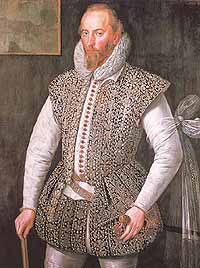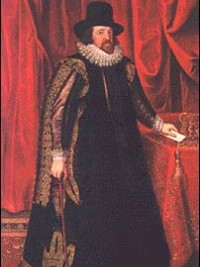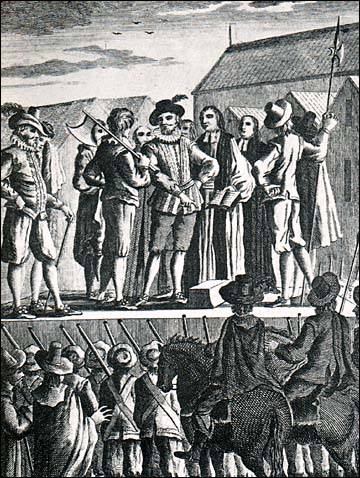|
Raleigh's
imprisonment was not quite so severe as
might be imagined; he was allowed servants,
and given every facility to pursue his interests
as a writer and as an amateur student of
science. For some time, his wife and family
were permitted to reside with him in the
Tower, and he was allowed regular visitors.
He became a hero to King James's eldest
son, Prince Henry, the Prince of Wales,
who petitioned his father for Raleigh's
release, and famously remarked: "Sure
no king but my father would keep such a
bird in a cage". But Henry's untimely
death, in 1612, deprived Raleigh of any
further support from that quarter.
Finally,
in 1616, at the age of 64, and having suffered
two strokes whilst in the Tower, Raleigh
was released to lead a further expedition
to Guiana, in search of El Dorado. The venture
was a complete failure, and led to the death
- amongst many others - of Raleigh's eldest
son, Wat. Unfortunately for Raleigh, a detachment
sent by him into Guiana encountered a Spanish
settlement; there was fighting and bloodshed,
and a number of the Spanish were killed.
When Raleigh returned to England, without
the gold with which James had hoped to enrich
his treasury, James was more than willing
to accommodate demands for Raleigh's execution
by the Spanish Ambassador, the Conde de
Gondomar. But James was afraid that the
good account which Raleigh made of himself,
at the treason trial, would be repeated
- to Raleigh's benefit, and James's detriment
- so James sought a way to rid himself of
Raleigh without a further trial.
At
this point, reference should be made to
another famous figure in the history of
English law, Francis Bacon - by then, Lord
Chancellor and Baron Verulam, subsequently
to become Viscount St Albans. Whatever fame
and respect Bacon is entitled to as an essayist,
philosopher and scientist, he is surely
one of the most odious creatures ever to
have disgraced judicial office at any time
or in any place. We have already seen how
he turned against his former patron, the
Earl of Essex, when Essex was on trial for
his life. At Elizabeth's request, and for
a substantial fee, he wrote a vicious account
of that trial; but, no sooner had James
ascended the throne, than Bacon again put
pen to paper, by way of an apologia
for James's "martyr". We have
seen, too, how he destroyed the judicial
career of the learned and sagacious Coke,
of whose brilliance and success Bacon was
profoundly jealous.
The
career of this undoubtedly talented lawyer
and scholar reached a fitting culmination
when he was impeached for accepting bribes
- an almost unique instance of graft in
the long and glorious history of the English
judiciary. Bacon's apologists, who are numerous,
argue that the acceptance of bribes by judges
was a common thing in Bacon's time, and
that Bacon did not allow the bribes to influence
his decisions. However, when James I (with
Bacon's assistance) was looking for an excuse
to sack Coke, Coke's conduct as Chief Justice
was subjected to the most meticulous examination,
and no plausible instance of any form of
corruption could be discovered. Nor does
it seem very probable that the bribes which
Bacon accepted were without any influence
on the exercise of his judicial powers;
yet, even if that were the case, it is difficult
to see how his conduct in accepting bribes
is made more virtuous by the fact that he
cheated the people who bribed him, by not
giving them the benefit of the influence
for which they had paid.
Bacon
was amongst the many visitors received by
Raleigh in the Tower, and it seems that
they became firm friends. Most likely, Bacon
had a very genuine interest in Raleigh's
scientific study and Raleigh's writings;
it may be the case that they collaborated
on some works, which for political reasons
Bacon could not risk publishing under his
own name; and they have even been linked,
in one of the more far-fetched emanations
of the Shakespeare "authorship controversy",
as jointly the "real" authors.
It was therefore natural that, when Raleigh
was offered his freedom to undertake the
expedition to Guiana, he sought Bacon's
advice. Raleigh was provided with a Commission
from the King, which not only gave Raleigh
liberty to undertake the voyage, but vice-regal
powers over the entire expedition, including
the power to dispense justice. Raleigh reportedly
asked Bacon whether he should seek the insertion
of a provision, formally pardoning him of
his previous treason conviction. Bacon's
advice to Raleigh was that a formal pardon
was unnecessary: that Raleigh had "a
sufficient pardon for all that is past already,
the King under his Great Seal having made
you Admiral, and given you power of marshal
law".
|

Raleigh
(in old age)
|

Bacon
|
However,
after Raleigh's return from Guiana, and
when James sought the Privy Council's advice
as to how Raleigh should be dealt with,
it seems that Bacon was the first to suggest
that the King could obtain execution of
the sentence passed 15 years earlier. Other
members of the Privy Council scrupled at
the injustice of beheading Raleigh after
so long; some even argued that, whatever
the legalities of the situation, it was
distinctly dishonourable to treat Raleigh
as being still attainted of treason, after
he had been commissioned to undertake a
difficult and dangerous voyage of exploration
for the Crown's benefit, and had lost his
son in the process. The Privy Council provided
James with a number of options: a new trial
with new charges; a commission of inquiry
regarding the failed Guiana expedition,
with the possibility of a recommendation
that Raleigh's previous sentence be carried
into effect; or an application to the Court
of King's Bench for execution of the previous
sentence. But James, determined not to allow
Raleigh any further opportunity to increase
his popularity, would not contemplate any
possibility which allowed Raleigh again
to reclaim the public sympathy which he
had won over at Winchester, 15 years earlier.
So,
on 28 October 1618, a Writ of Habeas
Corpus was delivered to the Lieutenant
of the Tower, commanding that he bring Raleigh
before the King's Bench at Westminster.
The attorney-general, Henry Yelverton, applied
for "Execution of the former Judgment".
In Cobbett's State Trials, it appears
that Coke presided; but this cannot be correct,
as Coke had been dismissed as Chief Justice
two years earlier; in fact, Sir Henry Montague
presided as Chief Justice. Unlike the previous
proceedings, Raleigh was addressed with
particular courtesy and civility:
"I
am here called to grant Execution upon
the Judgment given you fifteen years
since; for which time you have been
as a dead man in the law, and might
at any minute have been cut off, but
the king in mercy spared you. … I know
you have been valiant and wise, and
I doubt not but you retain both these
virtues, for now you shall have occasion
to use them. Your faith hath heretofore
been questioned, but I am resolved you
are a good Christian; for your Book,
which is an admirable work, doth testify
as much. I would give you counsel, but
I know you can apply unto yourself far
better than I am able to give you; yet
will I, with the good neighbour in the
Gospel, who finding one in the way,
wounded and distressed, poured oil into
his wounds, and refreshed him, I give
unto you the oil of comfort; though,
in respect that I am a minister of law,
mixed with vinegar. Sorrow will not
avail you in some kind: for, were you
pained, sorrow would not ease you; were
you afflicted, sorrow would not relieve
you; were you tormented, sorrow could
not content you; and yet, the sorrow
for your sins would be an everlasting
comfort to you. You must do as that
valiant captain did, who perceiving
himself in danger, said, in defiance
of death; 'Death, though expectest me,
but manage thy spite, I expect thee'.
Fear not death too much, nor fear not
death too little: not too much, lest
you fail in your hopes; not too little,
lest you die presumptuously. And here
I must conclude with my prayers to God
for it; and that He would have mercy
on your soul. Execution is granted."
Thus,
having 15 years before been convicted of
treason on the pretext of a traitorous conspiracy
with the Spanish, he was now condemned to
die at the behest, ultimately, of the Spanish
Ambassador. As was remarked by his only
surviving son, Carew, Sir Walter "was
condemned for being a friend to the Spaniard;
and lost his life for being their enemy".

Raleigh's
execution
Raleigh
met his death on the scaffold, at Old Palace
Yard, Westminster, the following morning.
On the scaffold, he showed remarkable courage
and placidity. Inspecting the headsman's
axe, he remarked: "This is sharp medicine,
but it is a physician for all diseases".
He declined a blindfold, but - according
to legend - was permitted to smoke his pipe;
supposedly the first example of the traditional
indulgence for a condemned man. He made
a moving and dignified speech to the assembled
crowd and, before placing his head on the
block, proceeded to each corner of the scaffold
kneeling and asking the onlookers to pray
for him. When finally Raleigh placed his
head on the block, somebody suggested that
he was facing the wrong direction - that
he should face "the east of our Lord's
arising" - Raleigh replied that: "So
the heart be right, it is no great matter
which way the head lieth". But, to
oblige the crowd, he stood up and rearranged
himself. When he made the signal that he
was ready, the axeman hesitated, so Raleigh's
last words were: "Strike man, strike!".
Yet
subsequently, in Raleigh's cell, was found
a poem, apparently written by during his
last night:
Even
such is time, that takes in trust
Our
youth, our joys, our all we have,
And
pays us but with earth and dust;
Who,
in the dark and silent grave,
When
we have wandered all our ways,
Shuts
up the story of our days;
But from
this earth, this grave, this dust,
My
God shall raise me up, I trust.
|



